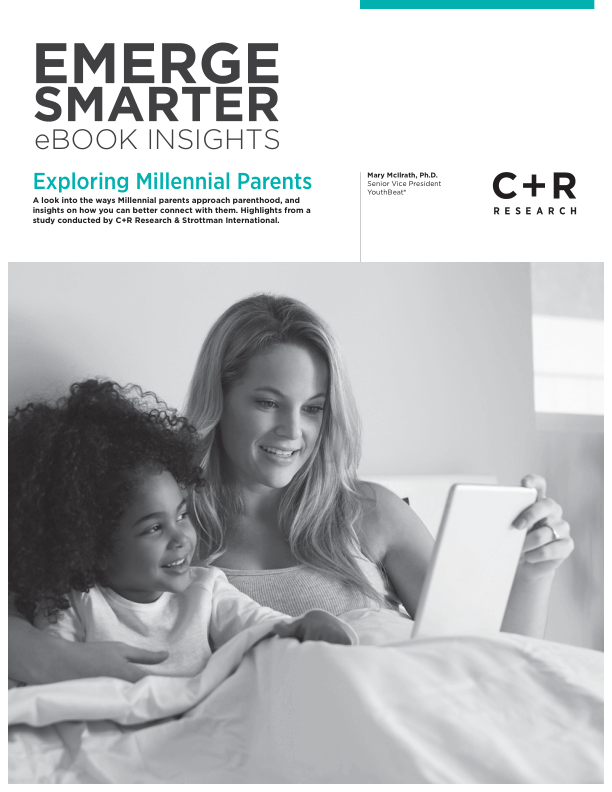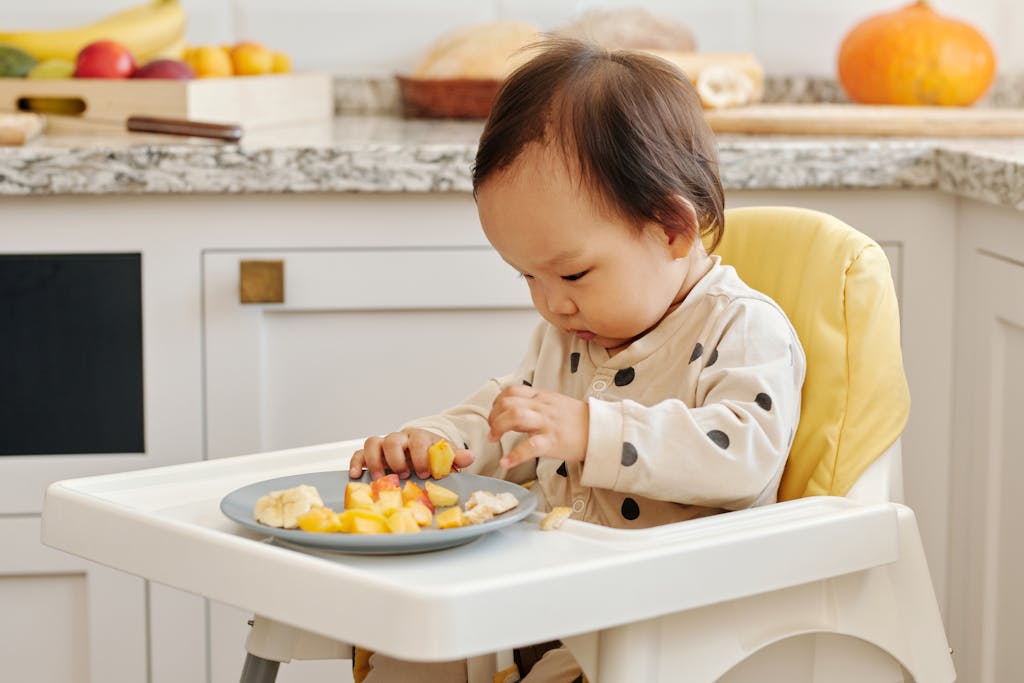
millennial market research: millennial parenting
introduction
But, who are they? Well, that depends. If you have done any kind
of inquiry into this cohort, you might have heard things like: they’ve
been given trophies all of their lives; they live with their parents;
they’re entitled and extremely narcissistic.
Yet, when we talk to Millennials at C+R, they’re adamant that what’s being said about them isn’t a truthful representation of who they are. Further, when talking to Millennial parents specifically, the attributes so consistently ascribed to them turn upside down.
contributors to this guide

Mary McIlrath
Senior Vice President, C+R Alum
The ‘First’ at Many Things
Millennials have come of age having experienced their ‘first’ during historically significant events. For instance, they’re the first post-9/11 generation. They’re the first generation to go to school with cellphones. They’re the first generation to go to work post-dotcom. They’re the first to grow into adulthood with social networking at their disposal. And, they’re the first group of individuals used to being able to go shop anytime and anywhere to get whatever they want.
This is the group that grew up with the Kids Choice Awards. They’ve grown up watching TV, expecting that if they don’t like the singer they see, they can vote them off. Keeping Up With The Kardashians has told them that anyone can be a star, and for any reason!
What a Millennial might take away from this childhood is an expectation that they have access to everything now, and a realization that the world is not just a place to explore but a place that must be understood. As a result, they understand that there is no ‘normal’ way of doing things necessarily. There is no one way to live, work, or raise their children. This sense of having to navigate new territory, figure things out for themselves has really shaped the sensibility of this cohort.
They understand that they must ‘chart’ their own course and cannot rely on institutions. This can result in the Millennial entrepreneurialism that we hear about often.

The Millennial cohort is evolving, but perhaps our framework for understanding them has not.
The term ‘Millennial’ is presently being used to represent 21- through 36-year-olds. At YouthBeat, we think that this may be part of the problem when it comes to the Millennial story. We think that this is a large span of ages that reflects a cohort of people with very different life stages.
This is a cohort that is growing, changing, evolving. They’ve grown up, but we haven’t necessarily grown up along with them as we have with other generations. For instance, when we think of what has been said about Gen-Xers and Boomers during their 20s, there’s a striking similarity to what has been said about Millennials. Could some of the critiques about Millennials be more about certain life stages—say, the 20s—than the cohort itself?
Additionally, much of the research being done on Millennials is done by people who are not Millennials themselves and possibly using frameworks that come from their own generation’s childhood experiences. This is a less than ideal way to get a fully rounded and honest picture of this cohort.
Themes Regarding
Millennial Parents
#1 Carpe Mom Diem.
When you talk to Millennial parents, you hear loudly and clearly that parenthood is something that’s tattooed all over them. Being a parent is so much of an identity that it is has almost become a profession—you can find calling cards for mommies increasingly on stationery sites like Minted.
What we hear more often than not from Millennial parents is that being a stay-at-home mom or dad is actually incredibly aspirational. They’re less likely to apologize for taking a break from work and more likely to apologize for not being a stay-at-home parent. It can be a privileged choice for most of them, and they can be much more willing to identify with being a mom (or dad) than with a certain profession.

#2 The Shifting Spotlight
When we ask Millennial parents about the narcissism that is attributed to them, what we hear over and over again is that this narcissism is something that they just don’t have time for. So, what’s changed? They’ve celebrated! They have, in some ways, overcorrected or embraced the idea that they are no longer in the spotlight themselves. Instead, their child is now the true star.
We see this in a great ad for Huggies Pull-Ups, First Flush Celebration. We know from talking to Millennial parents that they celebrate that first flush. They celebrate the second flush. They celebrate the third flush. They celebrate everything!
As another example, Kimpton Hotels has established itself as a family-friendly hotel chain. They have kid amenities like onsite babysitters, and fun entertainment like hula hoops. They understand that their guests expect their children to be catered to.
INSIGHT: In order to make Millennial parents feel like stars, put their kids front and center. If they feel their kids are feeling alienated somehow, they will seek other options.

#3 childhood is a special and cherished time
Millennial parents embrace the idea of an idealized childhood. This may be the result of their perceptions of their own childhood or from advertising ideals, storybooks, sitcoms, or media sources. They can even feel a bit nostalgic when it comes to their own childhood. For instance, a 2013 YMCA Summer Camp ad portrays moms as if they were from a different era. It’s a very contemporary ad for Summer Camp 2013, and we think it actually represents a great sentiment that connects with Millennial parents. It depicts a sense of nostalgia for things the way they used to be, things that are a bit old-fashioned, less digital. There’s a focus on childhood pleasure and playtime.
If you’ve been to a child’s birthday party recently—especially a child of a Millennial parent—, you might have been astounded at how far Millennial parents take this idea of treasuring childhood. Cherishing their child means fulfilling the child’s fantasy in a way that isn’t about keeping up with the Joneses. It isn’t about having the best or the biggest birthday party. It’s about fulfilling their child’s wishes, their fantasies, and creating magical experiences for them.
These kinds of experiences, or fantasy fulfillments, are part of the spirit of play we see prevalent among Millennial parents. For instance, this can be reflected in the treat bag which has evolved into a kind of candy buffet fantasy fulfillment, increasingly popping up in all kinds of parties such as birthday celebrations!
Another way Millennial parents create magical and special moments is by stepping away from digital experiences. Things like gardening with children have become a really big trend among Millennial parents, and camping with kids is making a comeback. Even things like sewing and old school crafts with their children are making a comeback!
INSIGHT: Help Millennial parents create an idealized childhood for their kids, the way childhood is supposed to be.

#4 They Take Childhood
Seriously, but Not Necessarily Themselves
There are countless viral videos online that show moms rapping, dads dancing, and more. This is indicative of how their lives have changed, and how they really embrace parenthood with a bit of humor.
We have seen multiple examples of apps that cater to playful parenting. Parents can upload pictures of their kids for coin tosses to humorously settle disputes, or transform them into dancing elves! Millennial parents want to have fun with their kids, and sometimes throw a little humorous spotlight on themselves as parents.
INSIGHT: As marketers, don’t be afraid to laugh along with Millennial parents as they embark on this playful and often comical journey called parenthood.

#5 team family
Millennial parents have embraced a new ethos. It’s called team family. It’s no longer this idea of mom (or dad) as COO. In fact, Millennial parents would rather be members of a team instead of someone in charge and directing traffic.
Millennial parents describe their family as a team and often speak about how their children are included in things like family decision-making. They talk about their family as a unit that wants to be together and do things together. This is not to imply that the individuality of their children— their unique perceptions and tastes—is not valued and appreciated.
Quite the contrary as we have already mentioned. Millennial parents and their children simply want to explore things together as a family. For instance, if you’ve ever watched any show where someone is looking for a new home, especially a Millennial family, the first thing they say is, ‘we really want an open space so that we can all be together and play.’
This is quite unlike what previous generations such as Gen-X may have experienced as children. Families from prior generations typically wanted to explore on their own, away from the ‘captain’ of the family. For instance, they might have watched TV alone or insisted on their own bedrooms and spaces more than the Millennial family.
INSIGHT: Position Millennial parents as part of a team. We think that’s really the key to success.

#6 Generation of Story Seekers
Millennial parents seek a show, not a product. They expect that everything you do as a brand can be seen or experienced in a multi-dimensional way. A great story is told when something unexpected happens—an event or a surprise.
Think about those birthday parties. Part of the reason Millennial parents create cherished experiences related to birthday parties is due to the great stories these experiences create. They can be fantastical which helps make something sticky and salient. It’s something they can share.
INSIGHT: Millennial parents cherish stories when it comes to their children and their preferred brands.

#7 A Sensitive Child is the New Successful Child
Millennial parents see their child as being measured in multiple ways but, most importantly, they see their child’s success being measured by their happiness and being able to pursue the things they are passionate about. This generation, more than any other, acknowledges that there are different ways to parent and raise kids.
When we ask Millennial parents about the attributes they try to foster in their children, we hear things like independence, ingenuity, openness, resilience, and the desire to try new things. They want their children to do things, to embrace the idea of diversity when it comes to people and the world in general. It’s not about being the best. It’s not about being the achievers that Millennial parents often felt themselves set up to be.
We think Millennial parents might be the generation of parents to end the so-called ‘mommy’ (or daddy) wars. They are a group that seems more inclined towards connecting with one another and finding the common ground between different parents versus competing on the playground. We’re crossing our fingers but the indications that we have from the parents that we’ve spoken to seem to be that there’s a lot more love out there for other parents than there is competition.
INSIGHT: The way to connect with Millennial parents is to show them how you can help their child connect, care, and grow, not just compete.

#8 Eating Awakening
Kids are experiencing new foods and exploring different ways of eating. This is something that Millennial parents really embrace in their children and are trying to foster in them.
When we ask Millennial parents about food attributes that are really important to them, they tell us that they’re not really into calorie counting or reading labels necessarily, but rather, approach food in a holistic way. For them, they’re more concerned about good quality and natural foods rather than looking for things like additives, vitamin- or nutrient-enhanced foods and ingredients.
INSIGHT: When possible, speak to their aspirations regarding good quality and natural ingredients.

#9 CAREFUL consumption
Millennial parents believe brands can, and should, change the world. If you think about it, they didn’t grow up with moguls, with the identity of corporate people as being distant from them. They grew up with a different brand of CEO. They think about the people in charge of big businesses as being philanthropists and innovators—for example, Mark Zuckerberg, Bill Gates, and, of course, Steve Jobs. They think about these leaders as having the ability to actually do good, not just create good things or products.
When they think about brands, they believe brands can actually change the world. As a marketer, it’s important to understand that Millennial parents need to perceive your brand as one that wants to do good in the world regardless of the category. You’re up against brands that have very clear propositions about giving back to the world and that stand for philanthropy while also delivering great products and services. They expect you to be among those brands that care.
Lastly, Millennial parents see their children as needing to be connected, and affecting the world in a positive way. They appreciate brands that help their children learn lessons regarding philanthropy and altruism.
INSIGHT: If you want to really partner with Millennial parents, help them teach their children how to do good in the world. Millennial parents expect more than just a product or a service: they really expect brands to show their heart.


Mary McIlrath
Senior Vice President, C+R Alum
